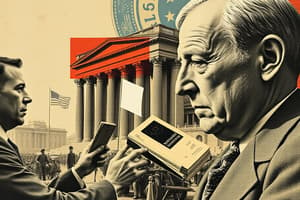Podcast
Questions and Answers
What is Classical Economics?
What is Classical Economics?
The theory that free markets operate under the laws of supply and demand and can and will regulate themselves.
What is Capitalism?
What is Capitalism?
An economic system in which investment in and ownership of the means of production, distribution, and exchange of wealth is made and maintained chiefly by private individuals or corporations.
Who developed Capitalism and in what work?
Who developed Capitalism and in what work?
Adam Smith in 'An Inquiry into the Nature and Causes of the Wealth of Nations' (1776).
What does Laissez Faire mean?
What does Laissez Faire mean?
What will there always be in a capitalistic economy?
What will there always be in a capitalistic economy?
How does the economy work itself out?
How does the economy work itself out?
What is the Law of Demand?
What is the Law of Demand?
What is the Law of Supply?
What is the Law of Supply?
Who is David Ricardo?
Who is David Ricardo?
What is Keynes' Theory?
What is Keynes' Theory?
What are the Four Main Components of Keynes' Theory? (Select all that apply)
What are the Four Main Components of Keynes' Theory? (Select all that apply)
Who are some Adopters of Keynesian Economics?
Who are some Adopters of Keynesian Economics?
What were Franklin D. Roosevelt's contributions during the Great Depression?
What were Franklin D. Roosevelt's contributions during the Great Depression?
What economic actions did Richard Nixon take?
What economic actions did Richard Nixon take?
What is supply-side economics as related to Ronald Reagan?
What is supply-side economics as related to Ronald Reagan?
What is Barack Obama's connection to Keynesian Economics?
What is Barack Obama's connection to Keynesian Economics?
What was a significant success of Keynesian Economics?
What was a significant success of Keynesian Economics?
What was a failure of Keynesian Economics?
What was a failure of Keynesian Economics?
What is a Stimulus Package?
What is a Stimulus Package?
What does Washington believe about the financial system?
What does Washington believe about the financial system?
What are the pros of a Stimulus Package? (Select all that apply)
What are the pros of a Stimulus Package? (Select all that apply)
What are the cons of a Stimulus Package? (Select all that apply)
What are the cons of a Stimulus Package? (Select all that apply)
What is Consumer Confidence?
What is Consumer Confidence?
Flashcards are hidden until you start studying
Study Notes
Classical Economics
- Operates under laws of supply and demand, regulating itself without government intervention.
Capitalism
- An economic system characterized by private ownership of production, distribution, and exchange of wealth.
Adam Smith
- Author of "An Inquiry into the Nature and Causes of the Wealth of Nations" (1776), laying the groundwork for free competition and trade.
Laissez Faire "Invisible Hand"
- Economic principle advocating minimal government interference in business, promoting self-regulation.
Unemployment in Capitalism
- Continuous unemployment exists as individuals choose their employment opportunities.
Self-Regulating Economy
- Economy functions as consumers purchase desired goods while sellers aim for profit.
Law of Demand
- Quantity demanded decreases as the price rises, and increases when the price falls.
Law of Supply
- Quantity supplied increases with rising prices, and decreases when prices fall.
David Ricardo
- Proposed a distribution model dividing national output among three social classes: laborers, capital owners, and landlords, where gains for one class often mean losses for another.
Keynes' Theory
- Advocates for government responsibility in managing the economy for public benefit.
Four Main Components of Keynes' Theory
- Engage in deficit spending to improve GDP.
- Control money supply.
- Maintain higher income with progressive taxation.
- Encourage lower interest rates to boost investment.
Adopters of Keynesian Economics
- Leaders such as Franklin D. Roosevelt, Richard Nixon, Ronald Reagan, and Barack Obama utilized government intervention in the economy.
Franklin D. Roosevelt
- Implemented New Deal policies during the Great Depression, many later deemed unconstitutional.
Richard Nixon
- Employed deficit spending to address recession, economic issues persisted during Carter's presidency.
Ronald Reagan
- Introduced supply-side economics, cutting taxes to spur growth and improve job rates.
Barack Obama
- Implemented a Stimulus Package to counter recession, effects still debated post-implementation.
Success of Keynesian Economics
- Notable during the Great Depression, with government-funded projects reducing unemployment.
Failure of Keynesian Economics
- The 1970s experienced inflation and criticism of government spending, leading to a return to classical economic thinking.
Stimulus Package
- Utilizes Keynesian principles to revive the economy, particularly highlighted during the 2007-08 crisis, focusing on increased government spending to compensate for decreased consumer spending.
Washington's Economic Belief
- Federal Reserve alone is insufficient; government borrowing is necessary to inject money into the economy.
Pros of Stimulus Package
- Increases money circulation, aiding businesses in loans, fostering job creation, and encouraging investments in new projects.
Cons of Stimulus Package
- Risks deeper national debt, increased bailouts, and challenges in determining effective fund allocation.
Consumer Confidence
- Vital to economic performance, heavily influencing success and stability of the economy.
Studying That Suits You
Use AI to generate personalized quizzes and flashcards to suit your learning preferences.




